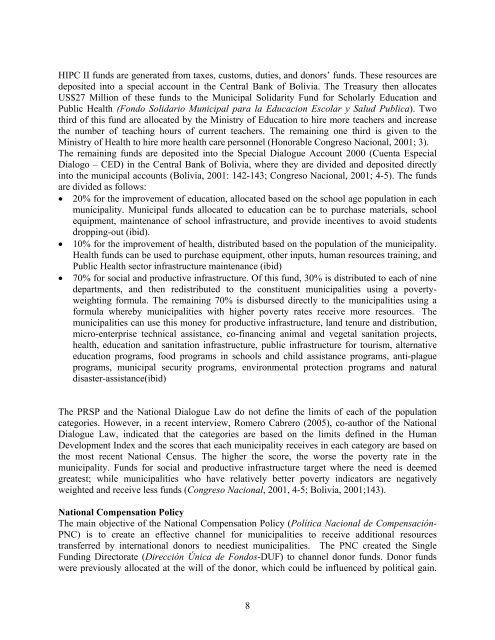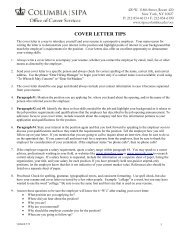Assessing the impact of PRSPs on Child Poverty: The Case of Bolivia
Assessing the impact of PRSPs on Child Poverty: The Case of Bolivia
Assessing the impact of PRSPs on Child Poverty: The Case of Bolivia
Create successful ePaper yourself
Turn your PDF publications into a flip-book with our unique Google optimized e-Paper software.
HIPC II funds are generated from taxes, customs, duties, and d<strong>on</strong>ors’ funds. <strong>The</strong>se resources are<br />
deposited into a special account in <str<strong>on</strong>g>the</str<strong>on</strong>g> Central Bank <str<strong>on</strong>g>of</str<strong>on</strong>g> <strong>Bolivia</strong>. <strong>The</strong> Treasury <str<strong>on</strong>g>the</str<strong>on</strong>g>n allocates<br />
US$27 Milli<strong>on</strong> <str<strong>on</strong>g>of</str<strong>on</strong>g> <str<strong>on</strong>g>the</str<strong>on</strong>g>se funds to <str<strong>on</strong>g>the</str<strong>on</strong>g> Municipal Solidarity Fund for Scholarly Educati<strong>on</strong> and<br />
Public Health (F<strong>on</strong>do Solidario Municipal para la Educaci<strong>on</strong> Escolar y Salud Publica). Two<br />
third <str<strong>on</strong>g>of</str<strong>on</strong>g> this fund are allocated by <str<strong>on</strong>g>the</str<strong>on</strong>g> Ministry <str<strong>on</strong>g>of</str<strong>on</strong>g> Educati<strong>on</strong> to hire more teachers and increase<br />
<str<strong>on</strong>g>the</str<strong>on</strong>g> number <str<strong>on</strong>g>of</str<strong>on</strong>g> teaching hours <str<strong>on</strong>g>of</str<strong>on</strong>g> current teachers. <strong>The</strong> remaining <strong>on</strong>e third is given to <str<strong>on</strong>g>the</str<strong>on</strong>g><br />
Ministry <str<strong>on</strong>g>of</str<strong>on</strong>g> Health to hire more health care pers<strong>on</strong>nel (H<strong>on</strong>orable C<strong>on</strong>greso Naci<strong>on</strong>al, 2001; 3).<br />
<strong>The</strong> remaining funds are deposited into <str<strong>on</strong>g>the</str<strong>on</strong>g> Special Dialogue Account 2000 (Cuenta Especial<br />
Dialogo – CED) in <str<strong>on</strong>g>the</str<strong>on</strong>g> Central Bank <str<strong>on</strong>g>of</str<strong>on</strong>g> <strong>Bolivia</strong>, where <str<strong>on</strong>g>the</str<strong>on</strong>g>y are divided and deposited directly<br />
into <str<strong>on</strong>g>the</str<strong>on</strong>g> municipal accounts (<strong>Bolivia</strong>, 2001: 142-143; C<strong>on</strong>greso Naci<strong>on</strong>al, 2001; 4-5). <strong>The</strong> funds<br />
are divided as follows:<br />
• 20% for <str<strong>on</strong>g>the</str<strong>on</strong>g> improvement <str<strong>on</strong>g>of</str<strong>on</strong>g> educati<strong>on</strong>, allocated based <strong>on</strong> <str<strong>on</strong>g>the</str<strong>on</strong>g> school age populati<strong>on</strong> in each<br />
municipality. Municipal funds allocated to educati<strong>on</strong> can be to purchase materials, school<br />
equipment, maintenance <str<strong>on</strong>g>of</str<strong>on</strong>g> school infrastructure, and provide incentives to avoid students<br />
dropping-out (ibid).<br />
• 10% for <str<strong>on</strong>g>the</str<strong>on</strong>g> improvement <str<strong>on</strong>g>of</str<strong>on</strong>g> health, distributed based <strong>on</strong> <str<strong>on</strong>g>the</str<strong>on</strong>g> populati<strong>on</strong> <str<strong>on</strong>g>of</str<strong>on</strong>g> <str<strong>on</strong>g>the</str<strong>on</strong>g> municipality.<br />
Health funds can be used to purchase equipment, o<str<strong>on</strong>g>the</str<strong>on</strong>g>r inputs, human resources training, and<br />
Public Health sector infrastructure maintenance (ibid)<br />
• 70% for social and productive infrastructure. Of this fund, 30% is distributed to each <str<strong>on</strong>g>of</str<strong>on</strong>g> nine<br />
departments, and <str<strong>on</strong>g>the</str<strong>on</strong>g>n redistributed to <str<strong>on</strong>g>the</str<strong>on</strong>g> c<strong>on</strong>stituent municipalities using a povertyweighting<br />
formula. <strong>The</strong> remaining 70% is disbursed directly to <str<strong>on</strong>g>the</str<strong>on</strong>g> municipalities using a<br />
formula whereby municipalities with higher poverty rates receive more resources. <strong>The</strong><br />
municipalities can use this m<strong>on</strong>ey for productive infrastructure, land tenure and distributi<strong>on</strong>,<br />
micro-enterprise technical assistance, co-financing animal and vegetal sanitati<strong>on</strong> projects,<br />
health, educati<strong>on</strong> and sanitati<strong>on</strong> infrastructure, public infrastructure for tourism, alternative<br />
educati<strong>on</strong> programs, food programs in schools and child assistance programs, anti-plague<br />
programs, municipal security programs, envir<strong>on</strong>mental protecti<strong>on</strong> programs and natural<br />
disaster-assistance(ibid)<br />
<strong>The</strong> PRSP and <str<strong>on</strong>g>the</str<strong>on</strong>g> Nati<strong>on</strong>al Dialogue Law do not define <str<strong>on</strong>g>the</str<strong>on</strong>g> limits <str<strong>on</strong>g>of</str<strong>on</strong>g> each <str<strong>on</strong>g>of</str<strong>on</strong>g> <str<strong>on</strong>g>the</str<strong>on</strong>g> populati<strong>on</strong><br />
categories. However, in a recent interview, Romero Cabrero (2005), co-author <str<strong>on</strong>g>of</str<strong>on</strong>g> <str<strong>on</strong>g>the</str<strong>on</strong>g> Nati<strong>on</strong>al<br />
Dialogue Law, indicated that <str<strong>on</strong>g>the</str<strong>on</strong>g> categories are based <strong>on</strong> <str<strong>on</strong>g>the</str<strong>on</strong>g> limits defined in <str<strong>on</strong>g>the</str<strong>on</strong>g> Human<br />
Development Index and <str<strong>on</strong>g>the</str<strong>on</strong>g> scores that each municipality receives in each category are based <strong>on</strong><br />
<str<strong>on</strong>g>the</str<strong>on</strong>g> most recent Nati<strong>on</strong>al Census. <strong>The</strong> higher <str<strong>on</strong>g>the</str<strong>on</strong>g> score, <str<strong>on</strong>g>the</str<strong>on</strong>g> worse <str<strong>on</strong>g>the</str<strong>on</strong>g> poverty rate in <str<strong>on</strong>g>the</str<strong>on</strong>g><br />
municipality. Funds for social and productive infrastructure target where <str<strong>on</strong>g>the</str<strong>on</strong>g> need is deemed<br />
greatest; while municipalities who have relatively better poverty indicators are negatively<br />
weighted and receive less funds (C<strong>on</strong>greso Naci<strong>on</strong>al, 2001, 4-5; <strong>Bolivia</strong>, 2001;143).<br />
Nati<strong>on</strong>al Compensati<strong>on</strong> Policy<br />
<strong>The</strong> main objective <str<strong>on</strong>g>of</str<strong>on</strong>g> <str<strong>on</strong>g>the</str<strong>on</strong>g> Nati<strong>on</strong>al Compensati<strong>on</strong> Policy (Política Naci<strong>on</strong>al de Compensación-<br />
PNC) is to create an effective channel for municipalities to receive additi<strong>on</strong>al resources<br />
transferred by internati<strong>on</strong>al d<strong>on</strong>ors to neediest municipalities. <strong>The</strong> PNC created <str<strong>on</strong>g>the</str<strong>on</strong>g> Single<br />
Funding Directorate (Dirección Única de F<strong>on</strong>dos-DUF) to channel d<strong>on</strong>or funds. D<strong>on</strong>or funds<br />
were previously allocated at <str<strong>on</strong>g>the</str<strong>on</strong>g> will <str<strong>on</strong>g>of</str<strong>on</strong>g> <str<strong>on</strong>g>the</str<strong>on</strong>g> d<strong>on</strong>or, which could be influenced by political gain.<br />
8



